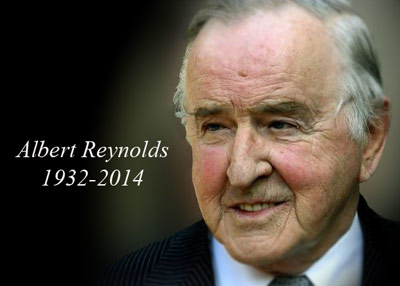 It is with deepest regret, we learn of the death of former Taoiseach and business entrepreneur, Mr Albert Reynolds, who died shortly before 3.00 am this morning, at the age of 81.
It is with deepest regret, we learn of the death of former Taoiseach and business entrepreneur, Mr Albert Reynolds, who died shortly before 3.00 am this morning, at the age of 81.
Mr Reynolds served as Taoiseach for almost three years and was regarded as one of the most influential leaders in Ireland’s history; making a lasting contribution to our country’s peace process through his partnership with England’s Sir John Major and which led to the Downing St. Declaration of 1993.
The straight-talking, risk-taking businessman and influential leader, who worked his way up the political ladder to lead Fianna Fáil in two coalition governments, was a native of Rooskey, Co. Roscommon.
First elected to the Dáil for the Longford/Westmeath constituency in 1977 representing Fianna Fáil; Mr Reynolds, within two years, moved up the government ranks to be appointed a government Minister.
As Minister for Posts and Telegraphs he helped revolutionise Ireland’s weak telecommunications system, transforming it, despite much pessimistic criticism, into one of the best communications systems in Europe. Later, as Minister for Finance from 1988 to 1991, he reduced all personal tax rates for the first time in over 20 years.
Elected Taoiseach in 1992, Mr Reynolds worked tirelessly with the then Prime Minister Sir John Major, Gerry Adams and SDLP leader John Hume to try to deliver much needed stability to Northern Ireland. The Downing Street Declaration, co-signed with British Prime Minister Sir John Major on December 15th, 1993, finally paved the way for an IRA ceasefire in 1994. Same in turn led loyalist paramilitaries to declare an end to terrorism, and this signing would paved the way to laying the foundations for the eventual signing of the Good Friday Agreement in 1998.
Following a dispute with Fianna Fáil’s then coalition partner, the Labour party, Mr Reynolds resigned as leader of Fianna Fáil and as Taoiseach in 1994. Mr Reynolds suffered political defeat in 1997 in an internal Fianna Fáil election to determine the party’s Presidential Candidate; beaten by Belfast-born academic Mrs Mary McAleese, latter who went on to win the Presidency and who served as head of state for two terms. Mr Reynolds later retired from politics in 2002 having serving some 25 years as an Irish TD.
Mr Reynolds had been diagnosed as suffering from Alzheimer’s disease, requiring 24-hour care and was in his later years reported as being unable to enter into conversation.
History records his full contribution to Irish life as being among some of this nation’s most significant achievements.
Mr Reynolds is survived by his wife Kathleen, two sons and five daughters.
Go ndéana Dia trócaire ar a anam dílis.

Leave a Reply